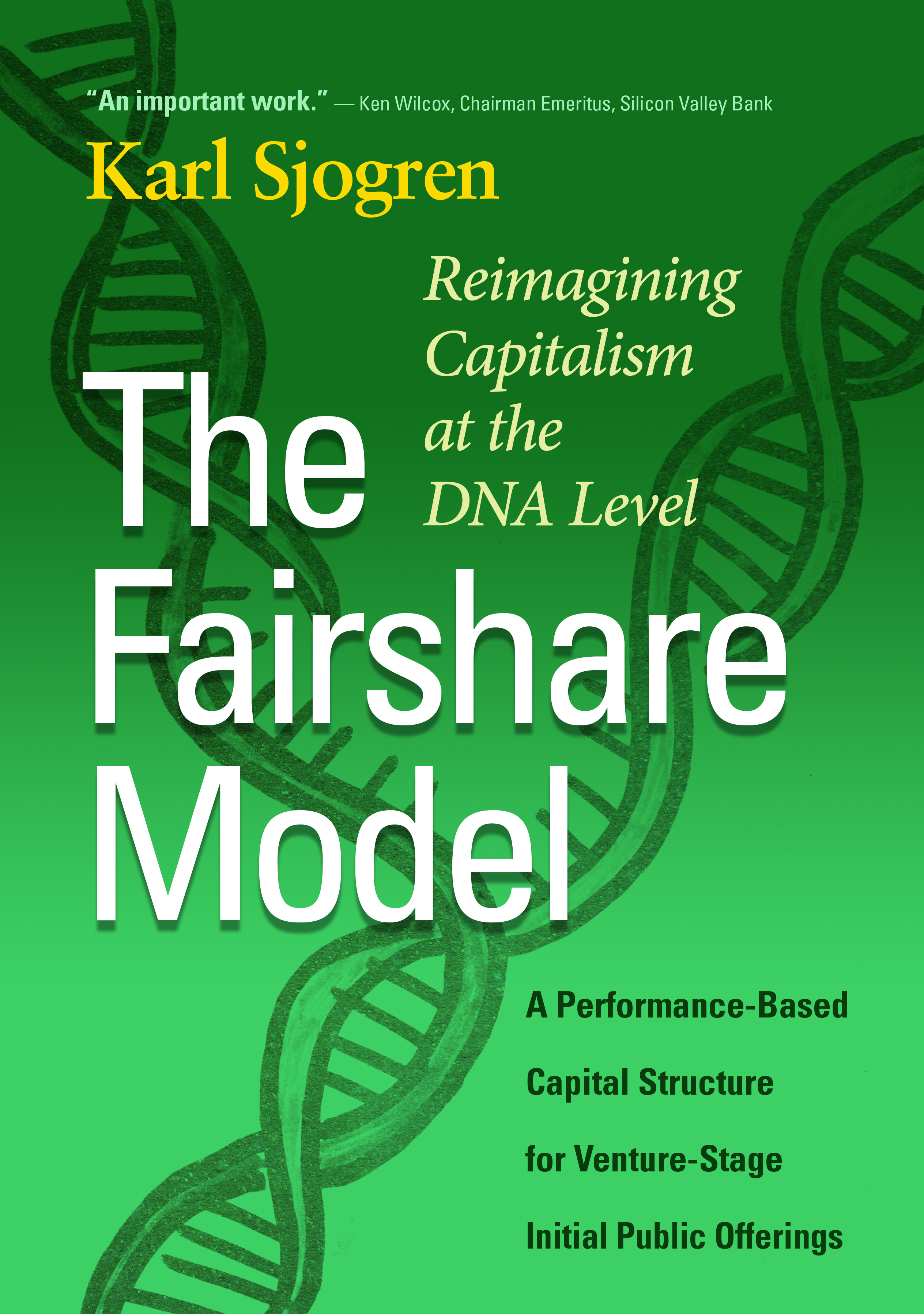
Author: "The Fairshare Model: A Performance-Based Capital Structure for Venture-Stage IPOs"
Contributor's Links:
The Fairshare Model Amazon
The Fairshare Model is an idea for a performance-based capital structure that redefines capitalism at the DNA level, where ownership interests are set.When used to raise venture capital via an IPO, it balances and aligns the interests of investors and employeescapital and labor.
Author Karl ...more
The Fairshare Model is an idea for a performance-based capital structure that redefines capitalism at the DNA level, where ownership interests are set.When used to raise venture capital via an IPO, it balances and aligns the interests of investors and employeescapital and labor.
Author Karl Sjogren utilizes highly approachable language, humor, and analogies, along with insights about capital markets. The result is an eclectic, yet inviting discussion that might occur in a graduate-level symposium on economics, finance and philosophy.
This groundbreaking book focuses on startup valuationsmicroeconomics. But it also considers the macroeconomic implications of the Fairshare Model for economic growth, income inequality, and shared stakeholding, as well as game theory and financing of blockchain projects.less




Latest Comments
Making Sense Of Pandemic Valuations
Hi Issac! Glad to hear you enjoyed the article. Be sure to check out the other two that I posted after this one, as they relate to your line of inquiry.
As for your specific question, I think the pandemic has recast the near-term opportunities in healthcare and biotech. If a company looks like it will benefit from the new environment, its valuation will climb because more investors will have interest. That applies to the private and public sectors.
Class Action Investor Lawsuit Raises Facebook IPO Valuation Issues
There are many non-GAAP figures that can be relevant to a business.. Please provide an example of what you consider to be an inappropriate use of one.
Meanwhile, I'll give you a GAAP figure that is expensive to generate and doesn't provide useful information to any reader of a financial statement that I can think of--stock compensation expense. Theoretically, I don't see why it makes sense to report shareholder dilution an income statement matter. Practically speaking, everyone I can think of adjusts it off in their analysis--evidence that it is not useful. Dilution is relevant but the way GAAP handles this is not helpful.
I share your desire to see stronger investor protections but I believe better valuation data will be more beneficial than a change in accounting standards..
Applying John Rawls’ Theory Of Justice To IPO Valuation
Its hard if an IPO is priced "right" for long term investors. In my simple example, no one knows if my idea will be worth $1--it could be nothing, $0.05, $0.50 or $2.
An IPO is priced to ensure its is sold and give a 15% to 20% pop in the secondary market to those who buy shares from the company. See my prior article on IPO valuation www.talkmarkets.com/.../class-action-investor-lawsuit-raises-ipo-valuation-issues
The real issue is whether public investors should get a form of price protection to mitigate valuation risk. Price protection has proven itself in the VC industry--its considered an indispensable tool. The only question is whether public investors should get it too! I wrote about that here www.talkmarkets.com/.../shouldnt-public-venture-capital-investors-get-price-protection-too
The point I want to make in this article is that public investors who benefit most from IPO distributions would support price protection if they had to buy shares in the secondary market.
Class Action Investor Lawsuit Raises Facebook IPO Valuation Issues
Your cynical comment led me to wonder, did anyone with knowledge of the forthcoming reduction in ST projections short the stock? Less cynically, the desire to head off short sellers may be why FB lowered its guidance so quickly.
In any case, the point is that no one knows how to evaluate venture-stage deals. Better valuation data and IPO deal structures that are valuation-elastic, like those VCs get, are promising solutions.